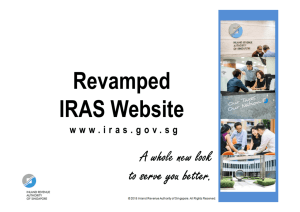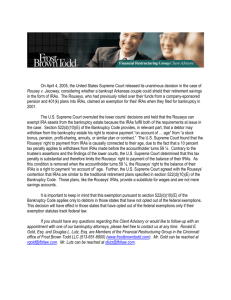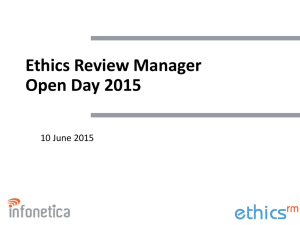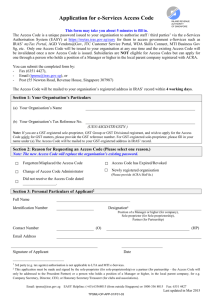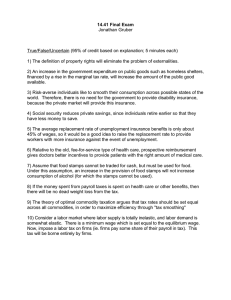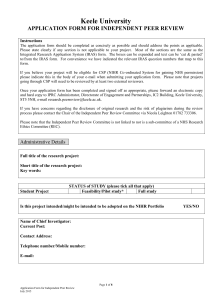Instructional & Research Academic Staff Working Group
advertisement
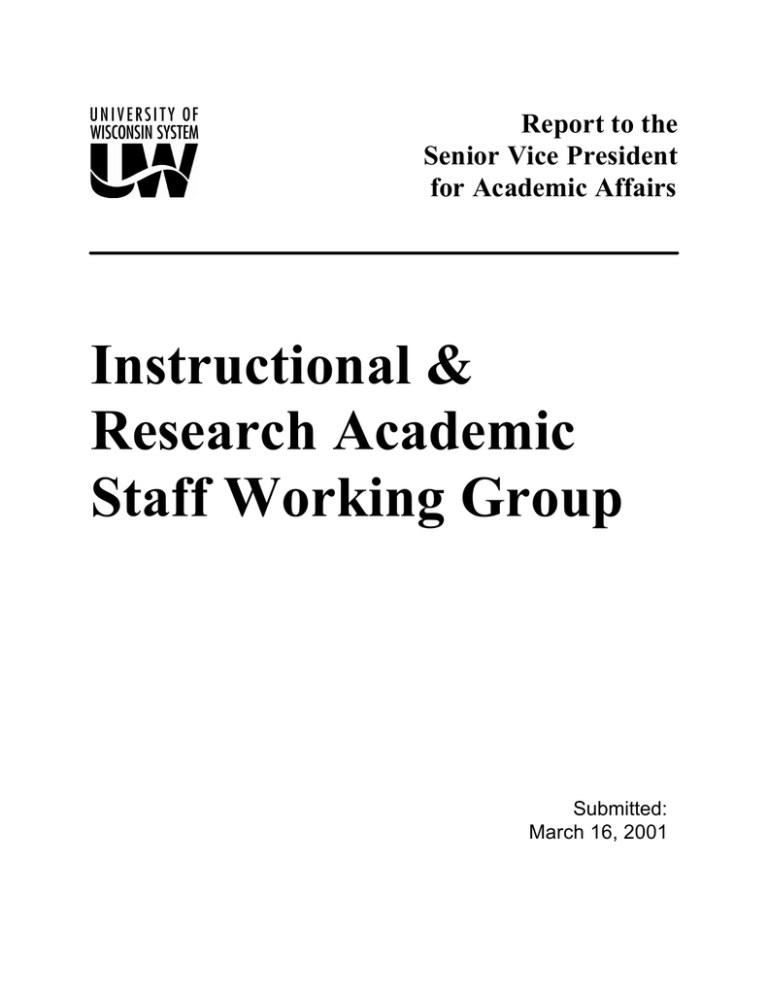
Report to the Senior Vice President for Academic Affairs Instructional & Research Academic Staff Working Group Submitted: March 16, 2001 Executive Summary The UW System Instructional and Research Academic Staff (IRAS) Working Group was convened in Fall 2000 to investigate and recommend titling options for IRAS and to propose initiatives to facilitate the integration of IRAS into institutional life. The working group was comprised of representatives from each of the UW Institutions including members of the academic staff, faculty, institutional administration, and UW System Administration. The recommendations that emerged from the efforts of the IRAS Working Group were guided by the underlying presumption that full- time, permanent instructional needs should be filled through faculty appointments in accord with the UW System Unclassified Personnel Guidelines. For positions that do not require work in all three areas of faculty responsibility (teaching, research and service) the working group acknowledges that academic staff appointments are appropriate, and that all members of the academic staff are an important and integral part of the UW System and its institutions. The IRAS Working Group puts forth several recommendations specific to its charge. Two new titling series are proposed that more accurately reflect the responsibilities, credentials and work expectations of career IRAS. The working group proposes an Instructional Professor and a Research Professor series of titles. The implementation and formal wording of position definitions are to be administered by the UW System Administration Office of Human Resources to be consistent with existing Category B title series. The working group also suggests several initiatives and actions for both the UW System Administration and individual UW Institutions that will enhance the integration of IRAS into institutional life. The recommendations are intended to increase the opportunities IRAS have to participate in programs, activities and governance. They are envisioned as ways to remove barriers to integration and not intended as additional or new job responsibilities / expectations. Recommendations include enhancing orientation for IRAS, providing modules of instructional and research support, improving opportunities for professional development, and increasing IRAS involvement in institutional and departmental governance. The working group identified several issues that did not specifically align with its charge. For example, there appears to be significant variation among UW institutions, divisions, schools/colleges and departments concerning IRAS appointments and utilization of career progression prescribed in current Unclassified Personnel Guidelines. The IRAS Working Group believes that UW institutions and UW System Administration should work to ensure that Unclassified Personnel Guidelines are applied consistently. The working group urges the Senior Vice President to direct institutions to continue working toward full implementation of the recommendations made in the Board of Regents’ 21st Century Study: Teaching Academic Staff in the UW System (Teaching Academic Staff Study). In addition, the Senior Vice President should develop a mechanism whereby institutions regularly report progress made toward implementing the recommendations made herein, as well as those made in the Teaching Academic Staff Study. Upon acceptance of any or all of these recommendations, the IRAS Working Group encourages the Senior Vice President to initiate immediate action toward implementation to support all IRAS in a manner reflective of the considerable and important contributions they make. Table of Contents I. Instructional & Research Academic Staff Working Group ..............Page 1 Charge Membership II. Background ............................................................................................Page 2 Board of Regents' Teaching Academic Staff Study Systemwide Initiatives III. Report and Recommendations of the Titling Subgroup ....................Page 3 Objectives Data Collections and Analysis Recommendations for Revisions to Instructional Staff Titles ...........Page 5 Faculty Associate Lecturer Instructional Professor Recommendations for Revisions to Researcher Staff Titles..............Page 6 Researcher Scientist Research Professor Recommendations Related to New IRAS Titles................................Page 7 Other Issues........................................................................................Page 7 IV. Report and Recommendations of the Integration Subg roup.............Page 7 Objectives Data Collection and Analysis Recommendations for UW System Administration ..........................Page 8 Recommendations for UW Institutions .............................................Page 9 V. Issues for Additional Consideration ....................................................Page 10 VI. Future Work ...........................................................................................Page 11 Appendix A: National Titling Data .............................................Available on- line Appendix B: Survey on IRAS Integration into Institutional Life.Available on- line http://www.uwsa.edu/acadaff/ias Instructional & Research Academic Staff Working Group The Instructional and Research Academic Staff (IRAS) Working Group submits the following report to the UW System Senior Vice President for Academic Affairs for consideration in fulfillment of its charge. As further response to the 1997 UW System Board of Regents' 21st Century Study Teaching Academic Staff in the UW System and the Regents' staffing principles accepted in March 2000, this systemwide working group was convened to investigate and recommend titling options for IRAS and to propose initiatives to facilitate the integration of IRAS into institutional life. The working group recognizes that strong relationships among faculty, IRAS, campus administrators and the UW System Administration will help to ensure that IRAS continue to make significant contributions to the success and vitality of the UW System, while they work in environments that are professionally rewarding. It further acknowledges that all academic staff is an important and integral part of the UW System and its institutions. Percent of all instructional The recommendations that emerged from the efforts of the IRAS Working Group were guided by the underlying presumption that full- time, permanent instructional positions should be filled through faculty appointments in accord with the UW System Unclassified Personnel Guidelines. Nevertheless, the working group Figure 1. Changes in proportion of faculty and instructional academic staff (IAS) acknowledges the reality that IRAS continue to make up a significant proportion of individuals 100% instructing students and 80% performing research. For instance, in 1987, 23.5 60% percent of the individuals 40% (head count) instructing 32.7% students were IRAS; in 20% 23.5% 1997, 32.7 percent (see 0% Figure 1). It is incumbent 1987 1997 upon each of the UW Institutions and the UW IAS Faculty System Administration to support this portion of its human resources in a manner reflective of the considerable and important contributions they make. The working group was comprised of representatives from each of the UW Institutions including members of the academic staff, faculty, institutional administration, and UW System Administration staff (see Table 1). Provost Charles Schelin, UWSuperior, served as chairperson of the working group that met several times between October 2000 and February 2001. To complete its work, the 19-member working group was divided into two subgroups; Integration, chaired by Professor Cathy Helgeland, UWManitowoc; and Titling, chaired by Senior Lecturer Breck Speers, UW-Oshkosh. Table 1. IRAS Working Group Members Barbara Burdick, Assistant Professor UW-Platteville Erika Sander, Assistant Vice Chancellor UW-Milwaukee Eric Eberhardt, Lecturer UW-River Falls Charles Schelin, Provost and Vice Chancellor UW-Superior Walter Graffin, Associate Professor UW-Parkside Breck Speers, Senior Lecturer UW-Oshkosh Cathy Helgeland, Professor UW-Manitowoc Jodie Wagner, Psychologist, Counseling & Testing Services, UW-La Crosse Jeff Janz, Executive Director of Residence Life UW-Whitewater Vicki Washington, Assistant to Chancellor UW-Extension Steve Lund, Director Academic Personnel Office UW-Madison William Meyer, Provost and Vice Chancellor UW- Stevens Point John Murphy, Dean, College of Arts & Sciences UW-Stout Don Reynolds, Professor UW-Eau Claire Jerrold Rodesch, Associate Professor UW-Green Bay Larry Rubin, Assistant Vice President UW System Administration Chuck McConnell, Assistant Vice President UW System Administration Fran Garb, Senior Academic Planner UW System Adminis tration Steve Bialek, System Academic Planner UW System Administration Background The UW System Board of Regents' Study of the University of Wisconsin System in the 21st Century recommended an examination of “the role of instructional and research academic staff within the UW System with the intention of improving their status, roles, rights and responsibilities.” To accomplish this examination, a committee made up of system academic staff and faculty conducted a survey of UW System institutions, and reviewed personnel policies and relevant literature. In 1998, the Board of Regents accepted a report from this committee entitled Teaching Academic Staff in the UW System (Teaching Academic Staff Study). The report acknowledged the complexity of staffing decisions as they relate to programmatic needs, fluctuating demands, availability of qualified faculty, and budget constraints. In this context, institutions were encouraged to establish plans to utilize fully the talents of the instructional and research academic staff, enhancing the learning environment for students across the UW System. The report revealed that: • Institutions varied widely in the extent of their use of IRAS, the ways in which IRAS were deployed at the institution, and the types of appointments and attendant job security they were afforded. • Departments within the institutions varied in their approaches to including IRAS in governance and other activities of the academic community, and to evaluating their work. • IRAS personnel policies and working conditions were not clearly articulated. • Issues related to IRAS could be addressed most effectively at the institutional level, with the UW System Administration best suited to provide a legal framework, guidance and examples of best practices. Furthermore, the report puts forward several recommendations designed to improve the UW System’s instructional environment for students. Initiatives that focused on improving the integration of IRAS into institutional life and on modifying personnel policies were proposed at both the individual institution level, as well as systemwide. The report is available on-line at: http://www.uwsa.edu/acadaff/ias The UW System Administration, Office of Academic Affairs responded to several of the systemwide recommendations outlined in the Teaching Academic Staff Study. In April 1999, teams from each of the 15 UW institutions attended a daylong forum that focused on IRAS issues. Teams discussed ways to integrate IRAS into institutional life and began developing plans to implement improvements. Additionally, academic personnel officers from each of the institutions participated in a focus group meeting in March 2000 and shared information about campus policy, process and practice as they relate to IRAS titling, hiring, and job security. At its March 2000 meeting, the Board approved a series of staffing principles. The principles were adopted to guide UW institutions over the next decade in rebuilding the instructional core as current faculty and academic staff retire. The principles called for a revision of titles for non-tenure instructional and research staff to reflect national titling trends, and for institutions to develop policies and practices to better integrate nontenure instructional and research staff into departments and institutions. The IRAS Working Group was subsequently convened to develop a plan to implement the Board’s staffing principles related to IRAS. Report and Recommendations of the Titling Subgroup The objective of the Titling Subgroup was to recommend suitable revisions to the UW System IAS and RAS titling options to reflect national titling norms and trends. This activity was responsive to the following recommendation included in the Teaching Academic Staff Study: UW System Administration should consider revising Category B titles to reflect national titling trends so that UW system instructional and research titles might be better understood for grant applications, in the national job market and or other academic purposes. Information was collected from a number of comparable institutions and university systems from across the country to ascertain how non-tenure track instructional and research staff are titled (see Appendix A: National Titling Data). Subgroup members compiled this information from websites, email inquiry and telephone conversations. Based upon the data collected, the Titling Subgroup generated and discussed several titling options at its meetings. The subgroup also monitored the discussions of governance groups proposing new IRAS titles at UW-Madison. The proposals under consideration at UW-Madison provided additional models for the subgroup to consider. During its discussions and deliberations, the Titling Subgroup considered several titling options along with multiple combinations of job definition criteria. The criterion that received significant attention was the minimum level of academic degree required for new titles. One alternative given consideration was that ALL professorial titles − instructional and research / prefix and no-prefix − should require a Ph.D. or terminal degree in field. Some members of the subgroup reasoned that a terminal degree is the standard for all faculty titles; it is required for the current Category B modified professorial title of Professor (CHS); and it is expected by many other universities that use modified professorial titles. The majority of the subgroup members, however, supported the requirement of an advanced degree as the minimum level of academic preparation for assistant and associate Instructional Professor and a Ph.D. or terminal degree as the minimum level for no-prefix Instructional Professor and all levels of Research Professor. For many years, individuals holding these credentials have worked at the level described in the proposed definitions. In addition, the lecturer title series as it is currently employed has limited descriptive value because it is assigned routinely to individuals with a wider range of roles and responsibilities. Identifying individuals who hold at least 50 percent appointment and have multiple years of service through the use of the proposed titles was considered to be an appropriate recognition of their contributions to the institution. The titles and job definitions proposed below allow for a useful distinction between non- faculty appointments of a purely temporary nature and those who have a more permanent character. They are supported by a majority vote of the entire IRAS Working Group. The Titling Subgroup recommends that appropriate sections of the UW System Unclassified Personnel Guidelines (UPG) − in particular, UPG #1 Unclassified Titles General Index and UPG #1 Attachment 1 Unclassified Title Definitions Book − be revised to reflect the additions and modifications suggested below. The implementation and formal wording of the position definitions as presented are to be administered by the UW System Administration Office of Human Resources to be consistent with existing Category B title series. The revised and new titles below are to be applied for both appointment and for promotion. As a result of its investigations and discussions, the Titling Subgroup puts forth the following recommendations: A. Recommendations for Revisions to Instructional Staff Titles A.1 Retain four- level Faculty Associate series (assistant, associate, no prefix and distinguished). Series would be revised to reflect the following definition1 : Draft Definition: Faculty Associates provide instruction and training to students in an academic discipline or adult education, including formal, informal or laboratory instruction, either independently or under the general supervision of a faculty member. Responsibilities include instruction associated with more than one formal lecture or laboratory course or with supplemental modules to formal courses, training of Graduate Assistants, programming to adult and continuing education clients and frequently includes extension and teaching associated with instructional portions of faculty appointments. Responsibilities may involve development of disciplinary teaching techniques as an accompaniment to instructional responsibilities. This title series is primarily for persons who have an undergraduate degree in the disciplinary area of instruction or persons who possesses an advanced degree and hold less than a 50% appointment and/or are appointed with no expectation of renewal. A.2 Retain four- level Lecturer series (associate, no prefix, senior and distinguished). Series would be revised to reflect the following definition: Draft Definition: Lecturers provide formal classroom or laboratory instruction in an academic discipline, either independently or under the general supervision of a faculty member. The primary duties of a Lecturer are effective delivery of instructiona l material, testing and grading. However, the degree of involvement in course and curriculum development, course scheduling, advising and subject matter expertise differs significantly depending on the prefix. This title series is primarily for persons who have an undergraduate degree in the disciplinary area of instruction or persons who possess an advanced degree and hold less than a 50% appointment and/or are appointed with no expectation of renewal. A.3 1 Create three- level Instructional Professor series (assistant, associate and no prefix). Series would be created to reflect the following definition: Note: The UW System Administration Office of Human Resources in accord with state statute, administrative code and Board of Regents’ policy will prepare for Board approval specific definitions for revisions to existing titles, creation of new title series and administration of such as recommended herein. Draft Definition: Instructional Professors are members of the academic staff who independently engage in formal or informal instruction, in an academic discipline, in one or more of the following areas: traditional classroom setting, laboratory, outreach and continuing education or extension program. These individuals will possess the experience or knowledge necessary to carry out the responsibilities typically associated with the instructional or extension components of a faculty appointment. These would include one or more of the following: develop and teach a course(s), design curricula and/or techniques for instruction, or develop and present outreach programs in a discipline or integrated disciplines. Responsibilities may also include training Graduate Assistants. This title series is primarily for persons who hold an advanced degree, whose appointment is 50% or more and is renewable or indefinite. A terminal degree is ordinarily required for promotion to the no prefix Instructional Professor rank. B. Recommendations for Revisions to Research Staff Titles B.1 Retain four- level Researcher series (associate, no prefix, senior and distinguished). Series would be revised to reflect the following definition: Draft Definition: Researchers provide technical expertise in a research or scientific project at a more comprehensive and independent level than a Research Specialist. Solves problems in research, deve lopment, and applications by applying discipline-related skills normally gained from the completion of an advanced degree. May assist in the development of grant applications and the preparation and presentation of reports of research results, and in informal instruction of research students. B.2 Retain four- level Scientist series (associate, no prefix, senior and distinguished). Series would be revised to reflect the following definition: Draft Definition: Scientists are members of the academic staff who engaged in research in an academic discipline under the general supervision of or in collaboration with a faculty member or a Research Professor. A Ph.D. or the equivalent experience and/or knowledge required to conduct research activities are ordinarily required to for this title series. Individual identifies research problems; designs research methodologies, performs or supervise research, and prepares the results for presentation to professional organization or for scholarly publications. Scientists may supervise Research Specialists and other staff and students. B.3 Create three- level Research Professor series (assistant, associate and no prefix). Series would be created to reflect the following definition: Draft Definition: Research Professors are members of the academic staff who are independently engaged in research in an academic discipline. A Ph.D. or other terminal degree and the experience and/or knowledge required to conduct research activities at the level of a principal investigator or co-principal investigator are ordinarily required for this title series. Responsibilities are those typically associated with the research component of a faculty appointment and include the development and submission of research grant applications, supervision of research programs, presentation of research findings at national and international meeting, publishing research findings in scholarly journals and training Graduate Assistants. (Principal Investigator status is not automatically granted.) C. Recomme ndations Related to New IRAS Titles The Subgroup further recommends that the following implementation procedures be adopted. C.1 New salary minima need to be established for the new title series. UWSA will prepare a proposal for review by the institutions. C.2 When the new titles are created, each institution will use them as defined by the title definition. UWSA will provide training to the Academic Personnel officers. Implementation will be handled by each institution. C.3 Staff who meet the criteria for the new title series will be moved laterally to the new title series. The lateral assignment to a new title series does not require a salary adjustment except staff must be paid at least the minima. Salary reviews and advancement (promotion) within the title series will be handled under normal processes established at each institution. This may require additional training in the proper use of the title structure. D. Other Issues of the Titling Subgroup As a result of the subgroup’s investigations and discussions, it was evident that significant variability exists among department chairs’ (and other supervisors’) utilization of the current UPG title structure for IRAS career progression. Consequently, many departments do not regularly review the titles assigned to instructional and research academic staff for advancement. The Titling Subgroup recommends, therefore, that ongoing education occur regarding how to apply ALL unclassified titles. Report and Recommendations of the Integration Subgroup The objective of the Integration Subgroup was to recommend efforts and initiatives to facilitate the integration of IRAS into institutional life. One of the subgroup's strategies was to assess the degree to which the Teaching Academic Staff Study recommendations to integrate IRAS into institutional life have been implemented. The Integration Subgroup focused its investigations in four specific areas reflective of the recommendations made in the Teaching Academic Staff Study. The focus areas were: (1) Instructional and research support for IRAS, (2) Orientation provided IRAS, (3) Staff development and performance expectations, and (4) Governance. To complete its assessment, the subgroup distributed a survey and obtained an institutional response from each campus (see Appendix B: Survey on IRAS Integration into Institutional Life: Summary Report). Institutions were encouraged to obtain input from several stakeholder groups such as faculty, administration, instructional and research academic staff (Category B), academic staff (Category A), governance groups, etc. The survey revealed that UW institutions were at varying stages of planning or implementing the recommendations put forth in the study. Institutions varied in the type and level of instructional and research support (e.g., clerical assistance, office space, etc.) provided to IRAS. All of the institutions offered some type of orientation for IRAS, but found it challenging to provide this opportunity for the full range of IRAS appointments (i.e., full- time compared to part-time). The survey showed that a variety of professional development opportunities exist for IRAS. However, it uncovered that there was significant variation in how IRAS were made aware of and provided access to these opportunities. Finally, IRAS had significant opportunities to participate in governance at the institution level, but their inclusion in department level decision- making varied. The recommendations put forth by the IRAS Working Group are intended to increase the opportunities IRAS have to participate in programs, activities and governance at the system, institution and department levels. The proposed actions and initiatives are envisioned as ways to remove barriers to integration and not intended as additional or new job responsibilities for IRAS. As a result of its discussions and analysis of survey responses, the Integration Subgroup puts forward the recommendations that follow to facilitate and enhance the integration of IRAS into institutional life: A. Recommendations for UW System Administration to Facilitate Integration of IRAS UW System Administration should: A.1 Encourage participation in and the enhancement of systemwide professional development opportunities for IRAS (e.g., Office of Professional and Instructiona l Development (OPID) programs, UW System grants programs, systemwide conferences, etc.). A.2 Sponsor a series of IRAS forums that address IRAS issues. Opportunities should be available to share best practices, facilitate collegiality among IRAS and faculty, etc. A.3 Encourage System groups such as the OPID Council, Learning Technology Development Council (LTDC), Electronic Media Technology Council (EMTC), Women’s Studies Consortium, etc. that offer systemwide programs to include IRAS representation on their counc ils and other committees. A.4 Integrate IRAS news into existing systemwide newsletters such as OPID Talk, LTDC Teaching with Technology Today, etc. A.5 Enhance the System IRAS website to include a central location that links to IRAS resources and websites at each campus. A.6 Promote UW System grant programs to IRAS and include focus areas in Requests for Proposals that address research and projects that contribute to the professional development of IRAS. A.7 Encourage representation from both category A and category B academic staff on relevant systemwide committees. A.8 Provide ways for department chairs to increase their understanding of policies and procedures related to the employment of IRAS. B. Recommendations for UW Institutions to Facilitate Integration of IRAS Instructional and Research Support for IRAS B.1 All IRAS should have a minimum support module that includes access to each of the following: (a) office space, (b) clerical support, (c) phone service, and (d) computer with internet access and e- mail. Orientation Provided IRAS B.2 All institutions should continue to offer new IRAS orientations to the institution, school/college, division, department, and campus. B.3 For those IRAS unable to attend orientations, institutions should develop alternative methods to acquaint IRAS with the institution, school/college, division, department, and campus. In addition, on- going orientation and information updates should be provided to continuing IRAS. Methods might include use of the web, “e-orientation,” or videotape. B.4 Provide mentoring support for IRAS to enhance their integration into the institution. B.5 Institutions should develop or enhance a webpage that includes information specific and relevant to IRAS. The webpage should be promoted widely across each institution. Professional Development B.6 Institutions should review professional development opportunities for IRAS to ensure that such opportunities are based on programmatic and/or professional need, not on title or longevity, in accordance with the Regents’ 21st Century Report. B.7 Institutions should consider offering new or expanded professional development opportunities for IRAS (e.g., staff exchange programs, study leave, support to attend and present at conferences, etc.). Governance B.8 Participation in departmental governance by career IRAS (those with an appointment of 50 percent or more and who have been with their institution multiple years) is encouraged. Institutions should ensure their eligibility to participate. B.9 Institutions should review the role of IRAS in academic staff and faculty governance at all levels to insure that the IRAS voice is heard. B.10 If institutions do not have a single faculty/academic staff governing body, executive committees of the respective faculty governing body and academic staff governing body should meet on a regular basis to discuss issues of mutual institutional interest. B.11 Academic staff governance groups should have representation from both category A and category B academic staff on relevant governing bodies, committees and groups. Issues for Additional Consideration The IRAS Working Group identified several issues that did not specifically align with its charge; however, the group determined these issues warranted additional consideration as they relate to the contributions IRAS make to and role they play in the UW System. First, the ratio of males to females with IRAS appointments continues to differ from those who hold faculty appointments as originally noted in the Teaching Academic Staff Study. According to November 2000 data, 51.1% of instructional academic staff (excluding CHS and clinical titles) are female, compared with 31.1% of the faculty. A variety of reasons are suggested for this difference. Nevertheless, UW institutions must remain vigilant to ensure gender-related inequities do not exist and are not perpetuated. Second, there appears to be significant variation among UW institutions concerning IRAS appointments. The IRAS Working Group believes that UW institutions and UW System Administration should work to ensure that Unclassified Personnel Guidelines are applied consistently. In particular, UPG 3.05, sections 1-4 are emphasized. The sections are as follows: (1) Institutional policies shall provide to academic staff with fixed term appointments, non-renewal notice periods of at least 3 months before the end of the appointment in the first two years; at least 6 months for service of at least two years but less than seven years; at least 9 months for service of at least seven years but less than ten years; and, at least 12 months for staff who have served ten years or more. Institutional policies shall provide to academic staff on probationary appointments, non-renewal notice periods of at least 3 months before the end of the appointment in the first year; 6 months before the end of the appointment in the second year; and, 12 months thereafter. (2) Institutional policies shall also specify due process protection in case of nonrenewal of staff who have served for at least seven years. [NOTE: This provision is intended to provide a uniform definition of the "substantial period of time" clause specified in s. UWS 10.03(1), Wis. Adm. Code.] (3) Each institution shall review annually the type of contract and terms of any academic staff member who has served more than seven years to determine the feasibility of moving such individuals to indefinite or multiple year appointments with increased job security. In making such a determination, the institution shall consider the continuing need for the position, funding source, and quality of employee's performance. Academic staff with seven years or more of service whose appointments do not provide at least two-year terms shall be given the reasons upon request. Academic staff with ten years or more of service whose appointments do not provide at least three-year terms shall be given the reasons upon request. (4) Every two years, UW System Administration shall audit a sample of academic staff appointments for compliance with existing policies governing appointment types , notice periods for non-renewal, and related conditions of job security. The Working Group urges the Senior Vice President to direct institutions to continue working toward full implementation of the recommendations made in the Teaching Academic Staff St udy. In addition, the Senior Vice President should develop a mechanism whereby institutions regularly report progress made toward implementing the recommendations made herein, as well as those made in the Teaching Academic Staff Study. Future Work The Integration Subgroup concluded that one of the integration recommendations made in the Teaching Academic Staff Study needs additional study. The recommendation states that institutions should “develop a plan that addresses staff development, performance expectations and evaluation, and other conditions of employment for IAS” (page 40). The subgroup concluded that this recommendation involves issues related to personnel policy. Consequently, the Integration Subgroup suggests that UW Institutions and UW System Administration conduct additional study on issues relating to performance expectations, evaluation and other conditions of employment. The IRAS Working Group discovered significant variability as to how each institution made use of the appointment length and continuity status codes defined in UPG #2, Attachment 1. Of the three continuity status codes defined, the fixed term, terminal contract status is most commonly given to instructional academic staff when other options may be applicable. The three codes definitions are: Fixed term, terminal contract. The appointment is for a finite length of time and there is no expectation of renewal; Fixed term, renewal intended contract. The appointment is for a finite length of time and renewal is intended; Rolling horizon. The appointment is for a guaranteed length of time based on annual reappointment; The IRAS Working Group recommends that UW System Administration and UW Institutions engage in a concerted effort to ensure that IRAS contracts are tendered using the most appropriate appointment length and continuity status possible. Finally, careful consideration must be given to the implementation of all recommendations, particularly those related to titling. It is imperative that an implementation plan be developed without delay to address issues related to salary structure; procedures for transition of current IRAS to new titles; and communication on the use of new titles with IRAS, personnel administrators, deans and department chairs. Upon acceptance of any or all of these recommendations, the IRAS Working Group encourages the Senior Vice President to initiate immediate actions toward implementation to support all IRAS in a manner reflective of the considerable and important contributions they make.
